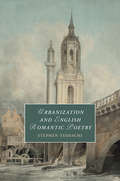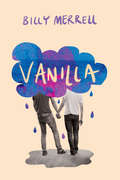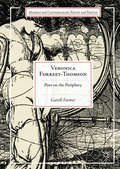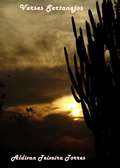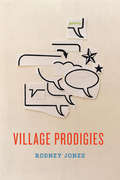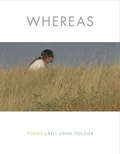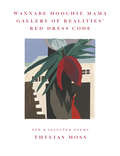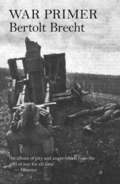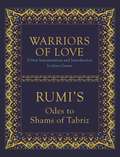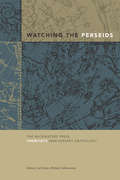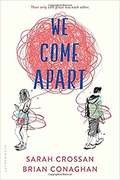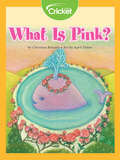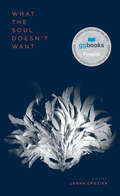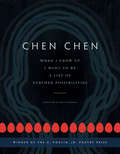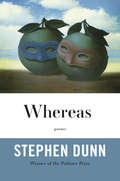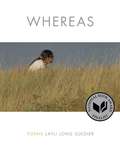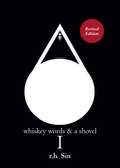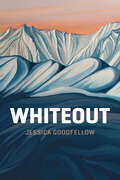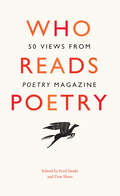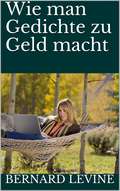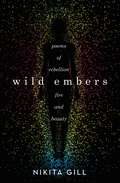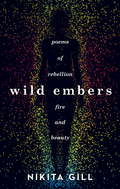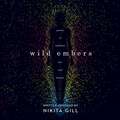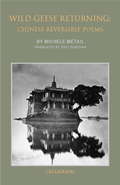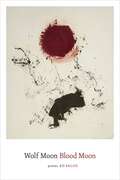- Table View
- List View
Urbanization and English Romantic Poetry (Cambridge Studies in Romanticism #117)
by Stephen TedeschiThrough an incisive analysis of the emerging debates surrounding urbanization in the Romantic period, together with close readings of poets including William Blake, William Wordsworth and Samuel Taylor Coleridge, Stephen Tedeschi explores the notion that the Romantic poets criticized the historical form that the process of urbanization had taken, rather than urbanization itself. The works of the Romantic poets are popularly considered in a rural context and often understood as hostile to urbanization - one of the most profound social transformations of the era. By focusing on the urban aspects of such writing Tedeschi re-orientates the relationship between urbanization and English Romantic poetry to deliver a study that discovers how the Romantic poets examined not only the influence of urbanization on poetry but also how poetry might help to reshape the form that urbanization could take.
Vanilla
by Billy MerrellA bold, groundbreaking novel about coming out, coming into your own, and coming apart.Vanilla and Hunter have been dating since seventh grade. They came out together, navigated middle school together, and became that couple in high school that everyone always sees as a couple. There are complications and confusions, for sure. But most of all, they love each other.As high school goes, though, and as their relationship deepens, some cracks begin to show. Hunter thinks they should be having sex.Vanilla isn't so sure. Hunter doesn't mind hanging out with loud, obnoxious friends.Vanilla would rather avoid them. If they're becoming different people, can they be the same couple?Falling in love is hard.Staying in love is harder.
Veronica Forrest-Thomson
by Gareth FarmerThis study offers a comprehensive examination of the work of the young poet and scholar, Veronica Forrest-Thomson (1947-1975) in the context of a literary-critical revolution of the late sixties and seventies and evaluates her work against contemporary debates in poetry and poetics. Gareth Farmer explores Forrest-Thomson's relationship to the conflicting models of literary criticism in the twentieth century such as the close-reading models of F. R Leavis and William Empson, postructuralist models, and the work of Ludwig Wittgenstein. Written by the leading scholar on Forrest-Thomson's work, this study explores Forrest-Thomson's published work as well as unpublished materials from the Veronica Forrest-Thomson Archive. Drawing on close readings of Forrest-Thomson's writings, this study argues that her work enables us reevaluate literary-critical history and suggests new paradigms for the literary aesthetics and poetics of the future.
Verses Sertanejos
by Aldivan Teixeira Torres Luís CostaSertão of the northeast, arid and barren land, Cradle of the greatest droughts, In cycles she delights herself. When they come it causes great damage, For the earth, fauna, flora and the man himself. Everything she consumes. And what to do? Before tremendous tragedy? There are two possibilities: Stay and fight to survive Or get out. Although the second option is more plausible The sertanejo insists for the first one For the love of her land, her own origins. Your attitud is admirable and praiseworthy. I feel proud of this noble character Which is coarse, thick, strong And at the same time simple. Her example shows us where the true force is. A powerful force that is able to fight against the impossible This is something that politicians do not even think about. And so the sertão of the northeast lies/dies forgotten.
Village Prodigies
by Rodney Jones“A novel in language as dense and lush and beautiful as poetry . . . [or] a book of poetry with the vivid characters and the narrative force of a novel? Whatever you care to call it, it’s a remarkable achievement.” — Richard Russo, Pulitzer Prize–winning author of Empire Falls Village Prodigies imagines the town of Cold Springs, Alabama, from 1950 to 2015 and unfurls its narrative reach as six boys—prodigies and swains—grow up and leave the familiarity of home and the rural South. Yet all prodigies, all memories, all stories inevitably loop back. Through a multiplicity of points of view and innovative forms, Rodney Jones plays with the contradictions in our experience of time, creating portals through which we travel between moments and characters, from the interior mind to the most exterior speech, from delusions to rational thought. We experience Alzheimer’s and its effect on family, listen to family lore and read family Facebook posts, relive war, and revive half-forgotten folktales and video games. In this deep examination of personal and communal memory, Jones blurs the lines between analog and digital, poetry and prose.
WHEREAS: Poems
by Layli Long SoldierThe astonishing, powerful debut by the winner of a 2016 Whiting Writers' AwardWHEREAS her birth signaled the responsibility as mother to teach what it is to be Lakota therein the question: What did I know about being Lakota? Signaled panic, blood rush my embarrassment. What did I know of our language but pieces? Would I teach her to be pieces? Until a friend comforted, Don’t worry, you and your daughter will learn together. Today she stood sunlight on her shoulders lean and straight to share a song in Diné, her father’s language. To sing she motions simultaneously with her hands; I watch her be in multiple musics.—from “WHEREAS Statements”WHEREAS confronts the coercive language of the United States government in its responses, treaties, and apologies to Native American peoples and tribes, and reflects that language in its officiousness and duplicity back on its perpetrators. Through a virtuosic array of short lyrics, prose poems, longer narrative sequences, resolutions, and disclaimers, Layli Long Soldier has created a brilliantly innovative text to examine histories, landscapes, her own writing, and her predicament inside national affiliations. “I am,” she writes, “a citizen of the United States and an enrolled member of the Oglala Sioux Tribe, meaning I am a citizen of the Oglala Lakota Nation—and in this dual citizenship I must work, I must eat, I must art, I must mother, I must friend, I must listen, I must observe, constantly I must live.” This strident, plaintive book introduces a major new voice in contemporary literature.
Wannabe Hoochie Mama Gallery of Realities' Red Dress Code: New and Selected Poems
by Thylias MossThis career-spanning volume by Thylias Moss, one of America's most revered literary innovators, conveys the dazzling spectrum of her hypnotic poetic output, written over the past thirty-five years and including selections from each previous book as well as previously unpublished new poems. A poet whose innovations have influenced generations of writers, Thylias Moss is a sort of taxonomist-preacher, whose profound meditation on American culture underlies and propels the dazzling lyrical and impassioned passages she writes in outraged response. This new volume gathers together substantial selections from her previous books and follows them with more than fifty pages of daring new work. Whether in early poems or more recent output, Moss make no promises of smooth sailing: even when they begin with beloved cultural icons (Robert Frost, Dr. Who, the Statue of Liberty), her poems spiral outward, insisting on new perspectives, truths, and realities--particularly of African American experience. For more than three decades, Moss has been a fearless re-inventor of poetry's possibilities. Her New & Selected is a momentous publication by "a visionary storyteller, a major figure in contemporary American poetry" (Charles Simic).
War Primer
by Bertolt Brecht John WillettA terrifying series of short poems by one of the world’s leading playwrights, set to images of World War IIIn this singular book written during World War Two, Bertolt Brecht presents a devastating visual and lyrical attack on war under modern capitalism. He takes photographs from newspapers and popular magazines, and adds short lapidary verses to each in a unique attempt to understand the truth of war using mass media. Pictures of catastrophic bombings, propaganda portraits of leading Nazis, scenes of unbearable tragedy on the battlefield — all these images contribute to an anthology of horror, from which Brecht’s perceptions are distilled in poems that are razor-sharp, angry and direct. The result is an outstanding literary memorial to World War Two and one of the most spontaneous, revealing and moving of Brecht’s works.
Warriors of Love: Rumi's Odes to Shams of Tabriz
by James Cowan Mevlana RumiIn 1244 a man wrapped in a coarse black coat entered Konya and so into the life of Islam’s most celebrated poet and mystic: Mevlana Jalaluddin Rumi. A wanderer and spiritual vagabond, Shams of Tabriz proceeded to wrestle with Rumi’s soul. What he wanted from his protégé was for him to embody a wilder, more robust spirituality that would enable him to embrace life’s rawness more completely than any saint had done in the past.Warriors of Love is a fresh interpretation of a selection of 49 poems which were written by Rumi as metaphors for his love for God as well as for his friend Shams, the Wild One. In a long introduction on the life and times of Rumi and his friendship with Shams James Cowan also explores the historical facts of their encounter, Sufism, the Mevlevi Order of Dervishes, the new dimension that Shams brought to Islamic spirituality and the importance of friendship as a true path to God.
Watching the Perseids: The Backwaters Press Twentieth Anniversary Anthology
by Cat Dixon Michael CatherwoodWatching the Perseids: The Backwaters Press Twentieth Anniversary Anthology features poems from authors from the past 20 years. This anthology commemorates The Backwaters Press’s 20 years as a nonprofit literary publisher located in Omaha, Nebraska. Virtually every poet published by the press in its first two decades is represented here with two new, previously unpublished poems selected specifically for this volume.
We Come Apart
by Sarah Crossan Brian ConaghanA poetic, gifty offering that combines first love, friendship, and persistant courage in this lyrical immigration story told in verse. Award-winning authors Brian Conaghan and Sarah Crossan tell a thought-provoking dual-narrated tale about two troubled teens, one immigrating to a new home and the other facing domestic violence, whose paths cross in the unlikeliest of places. <p><p> Nicu has emigrated from Romania and is struggling to find his place in his new home. Meanwhile, Jess's home life is overshadowed by violence. When Nicu and Jess meet, what starts out as friendship slowly blossoms into romance as the two bond over their painful pasts and their hope and dreams of a better future. But will they be able to save each other, let alone themselves? <p> This illuminating story told in dual points of view through vibrant verse will stay with readers long after they've finished.
What Is Pink?
by Christina RossettiEverywhere you look, there are beautiful colors throughout nature!
What the Soul Doesn't Want
by Lorna CrozierIn her newest collection, Lorna Crozier describes the passage of time in the way that only she can. Her arresting, edgy poems about aging and grief are surprising and invigorating: a defiant balm. At the same time, she revels in the quirkiness and whimsy of the natural world: the vision of a fly, the naming of an eggplant, and a woman who — not unhappily — finds that cockroaches are drawn to her. “God draws a life. And then rubs it out / with the eraser on his pencil.” Lorna Crozier draws a world in What the Soul Doesn’t Want, and then beckons us in. Crozier’s signature wit and striking imagery are on display as she stretches her wings and reminds us that we haven’t yet seen all that she can do.
When I Grow Up I Want to Be a List of Further Possibilities (A. Poulin, Jr. New Poets of America)
by Chen ChenLONGLISTED FOR THE NATIONAL BOOK AWARD FOR POETRYWINNER OF THE A. POULIN, JR. POETRY PRIZEA LIBRARY JOURNAL BEST BOOK OF 2017 SELECTION: POETRY & LITERATUREON NPR BOOKS'S LIST OF "POETRY TO PAY ATTENTION TO: 2017'S BEST VERSE"A PUBLISHERS WEEKLY 2017 HOLIDAY GIFT GUIDE SELECTIONIn this ferocious and tender debut, Chen Chen investigates inherited forms of love and family—the strained relationship between a mother and son, the cost of necessary goodbyes—all from Asian American, immigrant, and queer perspectives. Holding all accountable, this collection fully embraces the loss, grief, and abundant joy that come with charting one's own path in identity, life, and love.
Whereas: Poems
by Stephen DunnPulitzer Prize winner Stephen Dunn examines the difficulties of telling the truth, and the fictions with which we choose to live. Incisively capturing the oddities of our logic and the whimsies of our reason, the poems in Whereas show there is always another side to a story. With graceful rhythm and equal parts humor and seriousness, Stephen Dunn considers the superstition and sophistry embedded in everyday life: household objects that seem to turn against us, the search for meaning in the barrage of daily news, the surprising confessions between neighbors across a row of hedges. Finding beauty in the ordinary, this collection affirms the absurdity of making affirmations, allowing room for more rethinking, reflection, revision, prayer, and magic in the world.
Whereas: Poems
by Layli Soldier<p>WHEREAS her birth signaled the responsibility as mother to teach what it is to be Lakota therein the question: What did I know about being Lakota? Signaled panic, blood rush my embarrassment. What did I know of our language but pieces? Would I teach her to be pieces? Until a friend comforted, Don’t worry, you and your daughter will learn together. Today she stood sunlight on her shoulders lean and straight to share a song in Diné, her father’s language. To sing she motions simultaneously with her hands; I watch her be in multiple musics. —from “WHEREAS Statements” <p>WHEREAS confronts the coercive language of the United States government in its responses, treaties, and apologies to Native American peoples and tribes, and reflects that language in its officiousness and duplicity back on its perpetrators. Through a virtuosic array of short lyrics, prose poems, longer narrative sequences, resolutions, and disclaimers, Layli Long Soldier has created a brilliantly innovative text to examine histories, landscapes, her own writing, and her predicament inside national affiliations. “I am,” she writes, “a citizen of the United States and an enrolled member of the Oglala Sioux Tribe, meaning I am a citizen of the Oglala Lakota Nation—and in this dual citizenship I must work, I must eat, I must art, I must mother, I must friend, I must listen, I must observe, constantly I must live.” This strident, plaintive book introduces a major new voice in contemporary literature.</p>
Whiskey Words And A Shovel I
by R. H. Sin<P>Whiskey, Words, and a Shovel, Vol. 1, is about reclaiming your power on the path to a healthy relationship.<P> It is a testament to choosing to love yourself, even if it means heartbreak.<P> Originally released in 2015, this re-rerelease packs the same punch as the first version, but makes an even greater connection with the soul of the reader.<P> Each piece has been re-seen and revamped to reflect the author's continuing journey with his partner, Samantha King, without whom this book would not exist.<P> Samantha is the muse, the "she" the writer speaks of; she is every woman who has felt like she wasn't good enough, and every woman who struggles to find love.
Whiteout (The Alaska Literary Series)
by Jessica GoodfellowWhen she was a toddler, Jessica Goodfellow’s twenty-two-year-old uncle, along with six other climbers from the 1967 Wilcox Expedition to Denali, was lost in an unprecedented ten-day storm blasting winds of up to three-hundred miles per hour. Just as North America’s highest peak is so massive that it has its own distinct weather system—changeable and perilous, subject to sudden whiteout conditions—a family whose loved one is irretrievably lost has a grief so blinding and vast that it also creates its own capricious internal weather, one that lasts for generations. Whiteout is Goodfellow’s account of growing up in this unnavigable and often unspoken-of climate of bereavement. Although her poems begin with a missing body, they are not an elegy. Instead, Goodfellow struggles with the absence of cultural ritual for the uncontainable loss of a beloved one whose body is never recovered and whose final story is unknowable. There is no solace here, no possible reconciliation. Instead, Whiteout is a defiant gaze into a storm that engulfs both the wildness of Alaska and of familial mourning.
Who Reads Poetry: 50 Views from “Poetry” Magazine
by Don Share Fred SasakiWho reads poetry? We know that poets do, but what about the rest of us? When and why do we turn to verse? Seeking the answer, Poetry magazine since 2005 has published a column called “The View From Here,” which has invited readers “from outside the world of poetry” to describe what has drawn them to poetry. Over the years, the incredibly diverse set of contributors have included philosophers, journalists, musicians, and artists, as well as doctors and soldiers, an iron-worker, an anthropologist, and an economist. This collection brings together fifty compelling pieces, which are in turns surprising, provocative, touching, and funny. In one essay, musician Neko Case calls poetry “a delicate, pretty lady with a candy exoskeleton on the outside of her crepe-paper dress.” In another, anthropologist Helen Fisher turns to poetry while researching the effects of love on the brain, “As other anthropologists have studied fossils, arrowheads, or pot shards to understand human thought, I studied poetry. . . . I wasn’t disappointed: everywhere poets have described the emotional fallout produced by the brain’s eruptions.” Even film critic Roger Ebert memorized the poetry of e. e. cummings, and the rapper Rhymefest attests here to the self-actualizing power of poems: “Words can create worlds, and I’ve discovered that poetry can not only be read but also lived out. My life is a poem.” Music critic Alex Ross tells us that he keeps a paperback of The Palm at the End of the Mind by Wallace Stevens on his desk next to other, more utilitarian books like a German dictionary, a King James Bible, and a Macintosh troubleshooting manual. Who Reads Poetry offers a truly unique and broad selection of perspectives and reflections, proving that poetry can be read by everyone. No matter what you’re seeking, you can find it within the lines of a poem.
Wie man Gedichte zu Geld macht
by Bernard Levine Roland GemmerlingSie schreiben Gedichte? Dann können Sie mit Ihrer Poesie Geld verdienen, indem Sie sie auf Grußkarten, Kalendern, Postern und Schildern veröffentlichen lassen. Wenn Sie sich Ihren Traum erfüllen und für Ihre Gedichte bezahlt werden möchten, ist dieses einzigartige Buch genau das richtige für Sie. Gedichte für Geld zu schreiben macht nicht nur unglaublich viel Spaß, sondern lohnt sich ungemein – schmieden Sie Reime und kassieren Sie Scheine!
Wild Embers: Poems Of Rebellion, Fire, And Beauty
by Nikita Gill"You cannot burn awayWhat has always been aflame"Wild Embers explores the fire that lies within every soul, weaving words around ideas of feeling at home in your own skin, allowing yourself to heal, and learning to embrace your uniqueness with love from the universe. Featuring rewritten fairytale heroines, goddess wisdom, and poetry that burns with revolution, this collection is an explosion of femininity, empowerment, and personal growth.
Wild Embers: Poems of rebellion, fire and beauty
by Nikita Gill'You cannot burn awayWhat has always been aflame'WILD EMBERS explores the fire that lies within every soul, weaving words around ideas of feeling at home in your own skin, allowing yourself to heal and learning to embrace your uniqueness with love from the universe. Featuring rewritten fairytale heroines, goddess wisdom and poetry that burns with revolution, this collection is an explosion of femininity, empowerment and personal growth.
Wild Embers: Poems of rebellion, fire and beauty
by Nikita Gill"They have lightning in their souls, thunder in their hearts, chaos in their bones."Nikita Gill's poetry has captured hearts and minds all over the world; her inspirational words have been shared hundreds of thousands of times online, been plastered across placards on international women's marches and even transformed into tattoos. This collection will showcase mostly unseen poetry and prose, delving into ideas about passion, identity, empowerment and femininity.Written and Read by Nikita Gill(p) 2017 Orion Publishing Group
Wild Geese Returning: Chinese Reversible Poems
by Jody Gladding Jeffrey Yang Michele MetailA breathtaking introduction to Chinese multidirectional poems, told through the story of Su Hui, the greatest writer of these poems who embroidered a silk with 840 characters--equaling as many as 12,000 multidirectional poems--for her distant husband.For nearly two thousand years, the condensed language of classical Chinese has offered the possibility of writing poems that may be read both forward and backward, producing entirely different creations. The genre was known as the “flight of wild geese,” and the poems were often symbolically or literally sent to a distant lover, in the hope that he or she, like the migrating birds, would return. Its greatest practitioner, and the focus of this critical anthology, is Su Hui, a woman who, in the fourth century, embroidered a silk for her distant husband consisting of a grid of 840 characters. No one has ever fully explored all of its possibilities, but it is estimated that the poem—and the poems within the poem—may be read as many as twelve thousand ways. Su Hui herself said, “As it lingers aimlessly, twisting and turning, it takes on a pattern of its own. No one but my beloved can be sure of comprehending it.” With examples ranging from the third to the nineteenth centuries, Michèle Métail brings the scholarship of a Sinologist and the playfulness of an avant-gardist to this unique collection of perhaps the most ancient of experimental poems.
Wolf Moon Blood Moon: Poems
by Ed FalcoIn Wolf Moon Blood Moon, Ed Falco considers love and the loss of love, what we have today and what we remember of yesterday, the promise of youth and the disappointments and pleasures of aging. By turns whimsical, meditative, and poignant, these poems examine the joys and sorrows of living.The first section offers a meditation on loss, as the author explores bereavements both personal and remote. From an elderly mother and her stroke-impaired son struggling to have a simple conversation, to a man coping with the breakup of his marriage, to strangers caught in the public tragedies of a flood or an act of mass violence, these are poems acknowledging that loss is inevitable, infused with grief, and borne with courage. The second section explores the turbulence, sensuality, and mysteries within a particular life. Speakers in these poems contemplate aging while on their way to see a Broadway play, recall a father’s violence and a mother’s selflessness, and explore the complexity of a world that seems impossible to comprehend. Together, the two sections suggest a poet looking back in contemplation.
